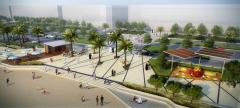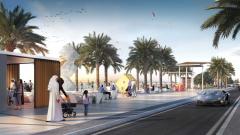Khalid Bin Sultan Al Qasimi: (Sharjah Urban Planning Council) A Futuristic Vision For Sustainability And Quality Of Life In Sharjah

The population of Sharjah jumped from 1.1 million in 2012 to 1.4 million in 2015, as per the estimation of Department of Statistics and Community Development in Sharjah (DSCS). The impact of rising population subsequently led to urban expansion, as well as economic and social growth in the emirate. In response to this growth, relevant authorities seek to develop strategic plans for expanding Sharjah’s capacity and to ensure the needs of the population are met via the creation of an efficient social, cultural, economic, and environmental framework. The goal is to work with different entities and provide innovative solutions to fulfil the need of its citizens.
As a result of this direction, the Sharjah Urban Planning Council (SUPC), was formed in 2006 in order to partner with different stakeholders, including entities and organizations from government and private sectors, to sustainably develop emirate’s urban landscape.
The SUPC was reformed in 2014 under the Amiri Decree No. 5 issued by His Highness Sheikh Dr. Sultan bin Muhammad Al Qasimi, Member of the Supreme Council Ruler of Sharjah, within the framework of the efforts being made to keep pace with the overall development in the Emirate of Sharjah.
Sheikh Khalid bin Sultan Al Qasimi, Chairman of SUPC, said: “Under the directives of HH Sheikh Dr Sultan bin Muhammad Al Qasimi, Member of the Supreme Council and Ruler of Sharjah, over the last four decades, the Emirate of Sharjah has succeeded in building a unique identity that combines tradition, authenticity, modernity, culture, and knowledge.”
He continued: “With an aim to further these achievements, protect our original identity and ensure sustainability as per the directives of HH the Ruler of Sharjah, SUPC was established to develop a comprehensive strategy for urban development and infrastructure projects. Including the responsibility to oversee the development and execution of a strategic plan.”
“The SUPC’s mandate is to enhance development and improve essential services that people need such as roads, transportation, green spaces, and social activity spaces,” he added.
Sheikh Khalid bin Sultan Al Qasimi highlighted SUPC’s key role in contributing to the emirate’s ‘Green’ initiatives, when it collaborated with the Sharjah Electricity and Water Authority on a project that saw the launch of electric car charging stations distributed across Sharjah, in a bid to support electric car owners and to spread positive awareness of more energy efficient transportation.
He explained: “We were successful in launching the first phase of this project, which saw the installation of 100 electric car charging stations in numerous business districts, retail centres, hospitals, main streets as well as government establishment across Sharjah.”
He continued: “The project will continue to extend its reach to a variety of areas in the emirate of Sharjah and will see the availability of larger quantities of electric car charging stations located across numerous public areas, in a bid to create an innovative and sustainable infrastructure of the electric auto industry.”
What is Urban Planning?
Sheikh Khalid bin Sultan Al Qasimi said: “It’s important that the public knows the meaning of urban planning and what the council’s mission and vision entail. Urban planning is a technical and political process that shapes the landscape of cities, highlighting the aesthetics and endows it with a unique character. Urban planning requires analytical skills interspersed with visionary thought process.”
The Chairman of SUPC added: “Building a city’s identity is an art as well as science. Since, it is based on data and urban growth rates, as well as foresight on the future of residential, commercial, industrial communities and other sectors. It is our responsibility towards every citizen, resident and visitor, to add value to enhance the social fabric of Sharjah.”
Role and Responsibilities
Sheikh Khalid bin Sultan Al Qasimi said: “The role of SUPC is to develop and oversee the preparation, execution, and follow-up of comprehensive urban planning strategies and infrastructure projects in the emirate. It cooperates and coordinates with the different stakeholders from the government sector to implement joint plans and policies in the field. SUPC’s responsibilities include the assessment of development plans and the issuance of recommendations to ensure effective functioning in the short and long term as well as compliance with all regulations.”
Sheikh Khalid bin Sultan Al Qasimi added: “The Council is responsible for ensuring cutting edge design and the use of high-quality materials in all projects. Detailed planning of projects also ensures that they are suitable and accessible for all ages and for people with special needs which anchors Sharjah’s stature as a leading pedestrian and elderly friendly city.”
“Another SUPC role includes establishing a database of all strategic studies, plans, regulations and data related to urban planning. This kind of organized collection leads to well-informed decisions and translates well into another responsibility which is to create and issue design specifications and manuals for urban planning, infrastructure, and environmental projects,” he noted.
Initiatives and Ambitions
On SUPC’s key plans and projects, Sheikh Khalid bin Sultan Al Qasimi, said: “SUPC launched the Sharjah Postal Code project three years ago. The project was designed to benefit both individuals and businesses alike to easily find specific locations. The project provides a free application that operates on any smart phone. It also improves delivery services and enables people to find the right location quickly.”
“The council collaborated with Google to implement the Google Street View project in Sharjah, which enables internet users in the UAE and across the world to browse the Emirate of Sharjah virtually and roam online through its streets, districts, monuments and landmarks, allowing them to explore Sharjah through high-resolution 360-degree panoramic imagery,” he added
“This new service helps residents to find specific destinations. Users can explore the locations of hotels and restaurants or identify a meeting point. People who would like to rent an apartment can also explore available real estate properties and gain insights into the surrounding areas,” he noted.
“The council also worked on and approved designs of five pedestrian bridges in five different areas in Sharjah in collaboration with the Sharjah Roads and Transport Authority (SRTA). The bridges are being built at King Faisal Street, King Abdul Aziz, Al Ittihad, and Al Taawun. The bridges ensure safe crossing and include elevators as well as shaded pedestrian walkways,” stressed the Chairman of SUPC.
“The five bridges have an inclusive design that considers all users, including children, senior citizens, as well as differently-abled persons. Building pedestrian bridges aligns with SUPC’s efforts to elevate the quality of services and enhancement of the well-being of Sharjah’s residents and visitors,” he added.
Regarding the bus stops project, Sheikh Khalid bin Sultan Al Qasimi, said: “The SUPC is collaborating with the SRTA and Sharjah Electricity and Water Authority (SEWA) to implement the project. It comprises building air-conditioned bus stops at different locations in Sharjah. The bus stops will be supplied with solar energy through solar panels. This will encourage Sharjah’s resident and visitors to use public transport in line with our efforts to develop and implement a variety of environment-friendly projects that reinforce sustainability.”
Sheikh Khalid Al Qasimi also addressed the sanitary sewer and storm-water drainage system upgrade, which was developed in collaboration with the Sharjah Municipality, Sharjah Directorate of Public Works and the Sharjah Department of Town Planning and Survey, which he described as “substantial and vital project”.
The aim is to improve the efficiency and performance of sewage treatment plants in Sharjah, as well as increasing their capacity to cope with the emirate’s current and future needs, in light of population growth and urban expansion.
The project includes renovating the main sanitary sewer system in the Emirate to improve its efficiency. Also, it will expand the main sewage treatment plant in Sharjah by establishing additional drainage points to address the problem of rainwater runoff in many areas in the emirate of Sharjah.
Sheikh Khalid bin Sultan Al Qasimi then spoke about the University City Road improvement project, “Extending over 3 kilometres and covering approximately 52,000 square meters, the project improves the public realm with natural landscapes, service amenities and facilities, public parking, and dedicated parking areas for all age groups including differently-abled persons, as well as safe pedestrian walkways,” he noted.
He pointed out that the design meets the best international standards, which will enhance the commercial area that connects Sheikh Mohamed Bin Zayed Road to the University City.
Sheikh Khalid bin Sultan Al Qasimi said: “Among other projects that encourage a healthy lifestyle in Sharjah is the Jogging and Cycling Track Network project. The multi-phased project envisions an integrated network of cycling and jogging tracks covering the entire emirate. The first phase will include the development of cycle and jogging paths along the city’s waterfront to boost the stature of Sharjah as an attractive destination to live, work and play. Subsequent phases will include, Emirati neighbourhoods and other areas.”
The Chairman of SUPC underscored that “the Sharjah Beach development project is one of the largest projects developed and implemented by the SUPC. The project will transform the public realm along the 3.3-kilometre Sharjah Beach Road that connects Ajman border to Sharjah Ladies Club (SLC) into a family and tourist destination, as well as one of the most prominent hotspots among the youths in Sharjah. A prime venue for social engagement that will add to making Sharjah a premier leisure, tourist, and family destination.”
He highlighted: “The project entails variety of public plazas, pedestrian paths, bike lanes, picnic places, seating areas, shading structures, public art areas, and water features along the entire route. The project also provides all required service amenities such as restrooms, shower facilities, prayer areas, bicycle parking system with about 1,100 vehicle parking spaces provided on both sides of the road.”
A city is the collective memory of inhabitants
Sheikh Khalid bin Sultan Al Qasimi said: “It is crucial to preserve the cultural and historical identity, including the Arab and Islamic features of the Emirate of Sharjah. By preserving and renovating old buildings and souqs we protect the collective memory that exemplifies Sharjah and its residents. At the same time, we seek to highlight the modern manifestation, represented by premium quality service and world-class infrastructure.”
Sheikh Khalid bin Sultan Al Qasimi stated that with strategic planning and efficient implementation we can improve the future of Sharjah. Through partnerships and collaboration with all entities relevant to real estate, urban planning, infrastructure, transport, information, and services, Sharjah can preserve its collective memory and forge ahead to elevate the social, cultural and economic stature of Sharjah.



